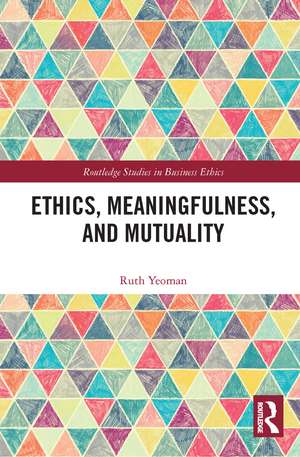Ethics, Meaningfulness, and Mutuality: Routledge Studies in Business Ethics
Autor Ruth Yeomanen Limba Engleză Paperback – 30 iun 2021
Ethics, Meaningfulness, and Mutuality poses critical questions related to organisational design by challenging limits to current thinking, such as the neglect by political philosophers of markets, firms and stakeholders, or by organisational theorists of business ethics. In so doing, the book advances our understanding of the theory and practice of ethical organising. Specifically, meaningfulness and mutuality will be used to yield values and principles for a philosophy of ethical organising which includes an account of human values in morally desirable collective action, and examines the relationship of collective action to the contested concept of shared value creation. Within a philosophy of ethical organising, mutuality permits an examination of the unavoidable relational nature of collective action, whereas meaningfulness addresses fundamental human concerns for significance and leading a life we have reason to value.
By addressing our status as relational beings with human needs for meaning, a philosophy of ethical organising brings critical thinking to the creation of morally informed organisational practices which are not only instrumentally beneficial for addressing wicked problems, but are normatively desirable for human flourishing.
| Toate formatele și edițiile | Preț | Express |
|---|---|---|
| Paperback (1) | 382.32 lei 6-8 săpt. | |
| Taylor & Francis – 30 iun 2021 | 382.32 lei 6-8 săpt. | |
| Hardback (1) | 764.20 lei 6-8 săpt. | |
| Taylor & Francis – 2 dec 2019 | 764.20 lei 6-8 săpt. |
Din seria Routledge Studies in Business Ethics
-
 Preț: 312.22 lei
Preț: 312.22 lei - 18%
 Preț: 843.40 lei
Preț: 843.40 lei - 18%
 Preț: 1057.09 lei
Preț: 1057.09 lei - 15%
 Preț: 424.06 lei
Preț: 424.06 lei - 22%
 Preț: 324.16 lei
Preț: 324.16 lei -
 Preț: 416.22 lei
Preț: 416.22 lei -
 Preț: 479.67 lei
Preț: 479.67 lei -
 Preț: 489.26 lei
Preț: 489.26 lei - 17%
 Preț: 258.70 lei
Preț: 258.70 lei -
 Preț: 396.51 lei
Preț: 396.51 lei - 12%
 Preț: 301.75 lei
Preț: 301.75 lei -
 Preț: 396.29 lei
Preț: 396.29 lei -
 Preț: 378.71 lei
Preț: 378.71 lei - 19%
 Preț: 270.82 lei
Preț: 270.82 lei -
 Preț: 382.27 lei
Preț: 382.27 lei -
 Preț: 389.66 lei
Preț: 389.66 lei -
 Preț: 379.60 lei
Preț: 379.60 lei -
 Preț: 389.38 lei
Preț: 389.38 lei - 18%
 Preț: 1000.27 lei
Preț: 1000.27 lei -
 Preț: 309.59 lei
Preț: 309.59 lei - 9%
 Preț: 935.26 lei
Preț: 935.26 lei
Preț: 382.32 lei
Nou
Puncte Express: 573
Preț estimativ în valută:
73.15€ • 76.59$ • 60.53£
73.15€ • 76.59$ • 60.53£
Carte tipărită la comandă
Livrare economică 05-19 aprilie
Preluare comenzi: 021 569.72.76
Specificații
ISBN-13: 9781032083568
ISBN-10: 1032083565
Pagini: 270
Dimensiuni: 152 x 229 x 20 mm
Greutate: 0.28 kg
Ediția:1
Editura: Taylor & Francis
Colecția Routledge
Seria Routledge Studies in Business Ethics
Locul publicării:Oxford, United Kingdom
ISBN-10: 1032083565
Pagini: 270
Dimensiuni: 152 x 229 x 20 mm
Greutate: 0.28 kg
Ediția:1
Editura: Taylor & Francis
Colecția Routledge
Seria Routledge Studies in Business Ethics
Locul publicării:Oxford, United Kingdom
Public țintă
PostgraduateNotă biografică
Ruth Yeoman is a Fellow at Kellogg College, University of Oxford, and an Associate Researcher at King’s College, University of Oxford. Ruth researches the concepts and application of meaningfulness and mutuality to work, organisations, and systems.
Descriere
Ethics, Meaningfulness, and Mutuality poses critical questions related to organisational design by challenging limits to current thinking, such as the neglect by political philosophers of markets, firms and stakeholders, or by organisational theorists of business ethics.
Cuprins
Preface
OVERVIEW
Bibliography
Index
OVERVIEW
The sustainability imperativeCHAPTER ONE: THE REALM OF VALUES
Motivating humanity
A human capability for ethical world-building
Meaningfulness and mutuality
Towards a philosophy of ethical world-building
Organisations and organising
Overview of chapters
Relational Conception of ValuesCHAPTER TWO: THE MEANINING OF VALUE
Eudaimonic reflection and cosmopolitan morality
Organisational values
Values-work
Values in ethical organising
Moral free space
Liberal value pluralism
Moral progress
Moral imagination
Meanings, understanding, and knowledge
Common knowledge
Changing values
Value and the sustainability imperativeCHAPTER THREE: MEANINGFULNESS AND MUTUALITY
The meaning of value
Forms of value
Value worth creating
Worth
Integrative worth and publicness
Ethical worlds
The life value model
Materialist ethics
Framing life value organisations
Elements of the life value model
The value of meaningfulnessCHAPTER FOUR: COLLECTIVE ACTION – INTEGRITY, PURPOSE, WORK
Meaningfulness – objective, subjective, hybrid
Sources of meaning and public meaningfulness
Practical reasoning
Ethics of care
Domination and alienation
Mutuality as an organising principle
Roots of mutuality
Mutuality and reciprocity
Constrained and expansive mutuality
Dimensions of mutuality
Ethical orientations – fairness, care, flourishing
Voice in ethical world-building
Structures and institutions
Metis – overcoming muteness and harnessing mutancy
Normatively-desirable collective actionCHAPTER FIVE: JUDGING, RESPONSIBILITY, AND AN ETHIC OF CARE
Collective moral agents
Integrity
Emotions and reasons
Morally worthy organisations
Philosophy of purpose
Organisational purpose
Aspects of purpose and purposing
Work – complex contribution
Agonistic republicanism
Consensus and conflict
Agonism – constructive conflict
Republicanism – responsible difference-making
Judging as thinking and feelingCHAPTER SIX: A PHILOSOPHY OF ETHICAL ORGANISING: JUSTICE, CAPABILTIIES, MEANINGFULNESS
Objects
Concern for objects
Bringing objects into view
Responsibility to create collective moral agents
Duties to organise
Responsibilities to ‘see’ others
Ethic of care
Materialist ethic of care
Becoming a self-determining being
Ethic of care and systems of social cooperation
Separations of distance, culture, and power
Supply chains as systems of social cooperation
Capability justiceCHAPTER SEVEN: THE SOCIETY OF MEANING-MAKERS: DIGNITY, EMPATHY, POWER
Social constructivism and justice
Seeing ourselves as world-builders
Constructing basic structures
Contesting ethical worlds
A Capability for ethical world-building
Individual capabilities
Collective capabilities
Organisational capabilities
Life capabilities
Ethical organising at the base-of-the-pyramid
The society of meaning-makersCONCLUSION: TOWARDS AN EMPIRICAL RESEARCH AGENDA
All affected
Mutuality in the society of meaning-makers
Creating the moral community
Distributed power system
Organisational power
Relational power
Discursive authority
Bibliography
Index
